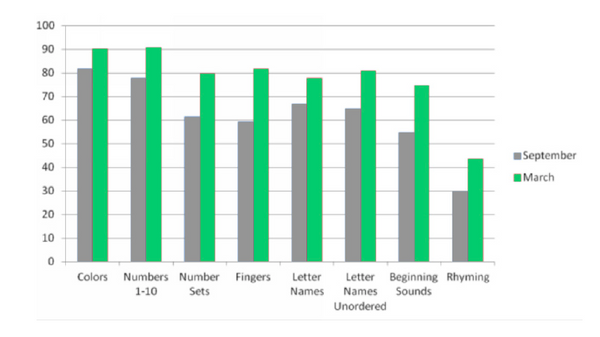Research
StepUp was created by an audiologist who saw dramatic improvements in academic and behavioral outcomes by combining kinesthetic learning, rhythm, and repetition with early learning curriculum. StepUp programs are now used by hundreds of schools in over 17 countries and have been shown to increase scores in reading and math.
PreK and Kindergarten Growth Report on Literacy and Math Skills
The StepUp iPad Assessment measures the speed and the accuracy of a child's
ability to respond correctly to auditory prompts. Speed and accuracy gives us a fluency score. The more fluent a child is with basic reading, math and handwriting skills the better they are able to learn more difficult concepts in higher grades.
Math, Engagement, and Behavior

Students using StepUp showed greater improvement in math, behavior, and engagement in the intervention period compared to the control period. A study using Dynamic Indicators of Basic Early Literacy Skills (DIBELS) showed significant difference in the math numbers/operations algebra scores between using traditional instruction and using the movement-based StepUp curriculum. Behavior and engagement were measured using best practices observational checklists.
Read Study
Writing Fluency
Average Percent Change

A study found Kindergarteners participating in StepUp showed significantly more growth in writing fluency, especially in the area of letter fluency. When compared to a control group, 21% more StepUp students were able to complete a number writing assessment and 25% more StepUp students were able to complete an alphabet writing assessment.
Read Study
LAC-3 & Visagraph
A study testing phonemic awareness, syllable perception and eye-movement coordination using LAC-3 and Visagraph assessments showed significant growth in students using StepUp programs.
Read Study
Sensory Integration
A case study of a 4-year-old who presented with significant difficulties performing many of the functional movement patterns required of pre-schoolers showed significant gains in movement patterns, auditory memory, auditory analysis, fine motor skills and confidence after 5 months in the Early Learning Program.
Developmental Coordination
A case study of an 8-year-old who presented with deficits in vestibular functioning, auditory memory and general gross and fine motor coordination showed significant gains in all areas after 5 months in the Integrated Rhythms Program.


